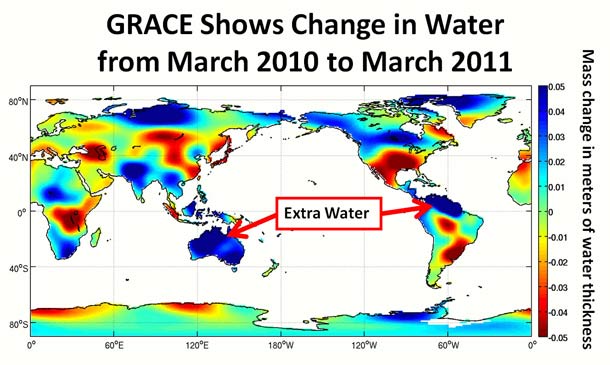In the last ten years a minimum of, ocean levels happen to be rising relatively continuously. Chiefly because of melting glaciers and ice sheets, and it is an all natural if harmful results of climatic change. The speed of sea level rise is a little over 3 millimeters each year (about 1/eighth inch each year) until this past year. The speed of increase all of a sudden corrected itself this year, and also the ocean levels really dropped a little, by about 6 mm. What went down

La Ni�a happened. Equatorial sea temps fluctuate on the cycle when they're warmer this is known as an El Ni�o, so when they re cooler this is La Ni�a. As you may expect, this affects how water disappears from the sea surface, and for that reason rain fall around the globe too. At this time we re inside a La Ni�a, indicated by drought conditions within the southern US (as with Texas), and heavier than normal rain fall around australia, northern South Usa, along with other locations:

That map comes from the NASA/German Aerospace Center s Gravity Recovery and Climate Experiment (Sophistication) satellites, which map where water is on earth and just how it moves around. This transformation in rain fall may be the reason for that lowering ocean level:
Where does everything extra water in South america and Australia originate from You suspected it the sea. Every year, immeasureable water are evaporated in the sea. Some from it falls back in to the sea as rain, a lot of it falls over land. "This season, the continents got an additional dose of rain, a lot to ensure that global ocean levels really fell over the majority of the this past year," states Carmen Boening, a JPL oceanographer and climate researcher. Boening and co-workers presented these results lately in the annual Sophistication Science Team Meeting in Austin, Texas.
That s pretty interesting! I didn t understand it could rain a lot that ocean levels might be affected, but there you have it. Doing the mathematics, I've found that the 6 mm drop is the same as a amount of very roughly 700 billion cubic meters of water, or 700 cubic kilometers (about 180 cubic miles). That's a lot of water! Disseminate over a lot area though Australia alone is 3 million square km it will get thinned out substantially. Still, everything extra rain isn't any have a picnic surges around australia wiped out several dozen people in the last year and destroyed a huge quantity of industry and infrastructure there.
Actually, when i stated growing ocean levels are an indication of climatic change, since ice melting in Greenland, for instance, flows in to the sea. Performs this mean the drop in ocean level signifies climatic change has corrected
Not a chance. El Ni�o and La Ni�a the weather is cyclical, changing every couple of years. As climatic change continues, the ocean levels will rise continuously, but superposed in addition would be the results of short-period shake like El Ni�o and La Ni�a. This is common in science to determine a linear trend having a cycle on the top from it you need to be careful when interpretation this type of plot to understand if that which you re seeing is lengthy-term change or short-term.
This reduction in ocean level is short-term, so when we switch to El Ni�o conditions warmer equatorial sea temps the popularity will reverse once more, and ocean levels will begin to rise continuously.
I m covering this for 2 reasons. The first is that It s interesting science, and shows how important it's to comprehend trends that may add or take away from one another, and just how satellite data are important to understanding our atmosphere.
Another reason is, obviously, which i expect we ll be talking with climatic change deniers who'll tout this finding weight loss proof that global warming isn t happening. I wish to mind that off in the pass. These data reveal that the planet s weather does change on a short while scale, but when you account for your, the imprint of climatic change remains, still real, but still affecting all of us.
Image credits: Ocean level dimensions: S. Nerem, College of Colorado Sophistication water map: NASA/JPL-Caltech.
Related posts:
- Dramatic glacial retreat caught by NASA satellite
- As arctic ice reduces, the same is true a denier claim
- NASA talks climatic change
- Our ice is vanishing
No comments:
Post a Comment